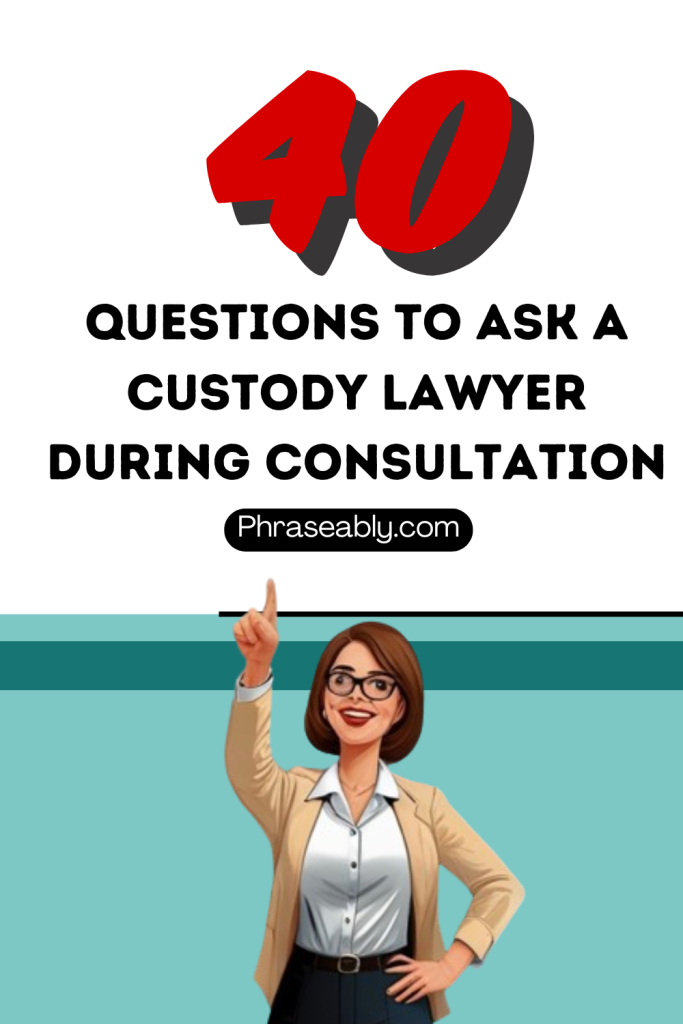One of the difficult processes of a divorce is obtaining child custody. Oftentimes, both parents are interested in getting full custody, especially if they feel that their partner is unfit for their children.
Whether you want full custody or joint custody, getting a good custody lawyer is important.
Also, asking the right questions to a custody lawyer is important to make the right decisions during the process.
Fortunately, in this article, I’ll be discussing 40 questions you can ask a custody lawyer to guide you through this difficult time.
40 Questions to Ask a Custody Lawyer During Consultation
There are numerous questions to ask a custody lawyer; from inquiring about their experience, style, fee, meeting time, and court requirements to your chances of winning.
Below are 40 questions to ask a custody lawyer:
- Why are you the best person for this case?
- Do I really need a lawyer?
- How long have you been in this practice?
- What has your experience been like?
- How many child custody cases have you taken up?
- How many cases have you won?
- What’s your style as a lawyer?
- What approach are you using for my case?
- What’s your general view on my case?
- How often do you keep in touch?
- Have you had a case that closely resembles mine, and how did you handle it?
- Can we settle this case out of court?
- How much should I budget?
- Will any additional costs arise?
- What information will you need from me?
- What are the things I should avoid that can weaken the case?
- What’s the time frame for settling a child custody case?
- What are the different stages involved?
- How many times do we have to meet?
- How many hours do meetings take?
- What are my rights?
- Does the child have a say?
- What’s the right way to file for custody?
- How does joint custody work?
- What are the things the court looks out for to determine custody?
- What exactly does ‘’best interest” mean?
- Can you explain physical and legal custody?
- Can my child choose whom they want to live with even after I’ve gained custody?
- Do mothers stand a better chance?
- In what ways can I prove I’m better off getting custody?
- Even if I get full custody, can the other parents have a say?
- What does full custody entail for the other parents?
- How does child support work?
- Do women pay child support?
- What are the things that can make me lose custody?
- Can there ever be a time when my custody rights are withdrawn?
- Can I regain custody rights after I’ve mended my ways?
- What are my chances of winning?
- Where do grandparents stand in all this?
- What additional things should I know?
Why Are You the Best Person for This Case?
Questioning a lawyer about their competence will help you see reasons why you should choose them to represent you. So, one of the questions to ask a custody lawyer is why they’re the best person for your case.
They should be able to tell you why you should make them your lawyer.
Do I Really Need a Lawyer?
While you don’t necessarily need a child custody lawyer during a child custody case, as you can represent yourself in court or settle out of court without a lawyer; having a lawyer represent you has a lot of advantages.
Whether you want to settle out of court or in court, a lawyer’s advice can go a long way. Also, they can help handle critical situations and increase your chances of winning.
How Long Have You Been in This Practice?
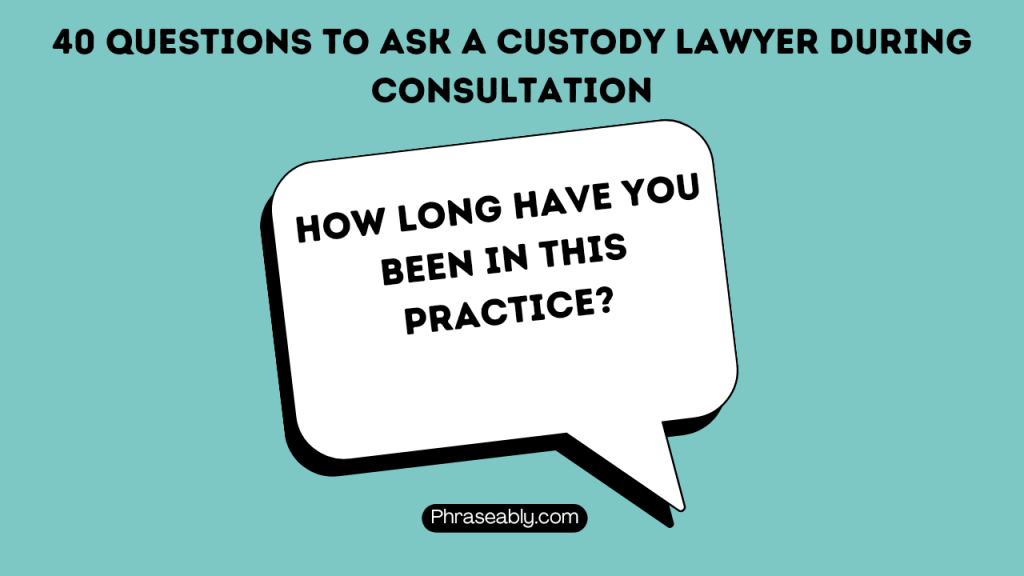
You should also ask your potential child custody lawyer how long they’ve been in practice to determine if they’re good enough for you.
It’s entirely up to you if you want a lawyer with more experience.
What Has Your Experience Been Like?
You should also ask a child custody lawyer what their experience has been like as a lawyer and also as a representative in a child custody case.
Sharing experiences like these can help you learn more about them. Also, apart from their experience as a lawyer, learning more about their experience with child custody cases can help you determine if they’re the best person for you.
How Many Child Custody Cases Have You Taken Up?
You should also ask a child custody lawyer to discuss with you the number of cases they have handled.
First, a child custody battle is not a simple thing and a mistake can cost you your victory.
Just like you can trust an experienced and qualified doctor with your life, you’ll want someone who truly understands the etiquette behind legal battles for your case.
So, learning about the number of cases they’ve handled gives you more insight into their knowledge in the field. Moreover, it helps you trust their capability more.
How Many Cases Have You Won?
Knowing about the number of cases a child custody lawyer has won can boost your confidence in them.
So, asking them about the number of cases they’ve won is one of the discussions you can have with them before hiring them to represent you in your child custody case.
What’s Your Style as a Lawyer?
Another question to ask a child custody lawyer is their style as a lawyer.
Someone who knows their job should have a unique approach when handling jobs. So, a custody lawyer should be able to discuss their style with you.
What Approach Are You Using for My Case?
Another thing you’d like to find out from a custody attorney is their approach to your case.
While they might’ve handled numerous custody cases, you’d want a lawyer who’ll take up your case as a unique one and use the best approach tailored specifically to your needs.
Any attorney who always applies the same strategy in every case has a low chance of winning.
Moreover, you’d want someone passionate about helping you win.
What’s Your General View on My Case?
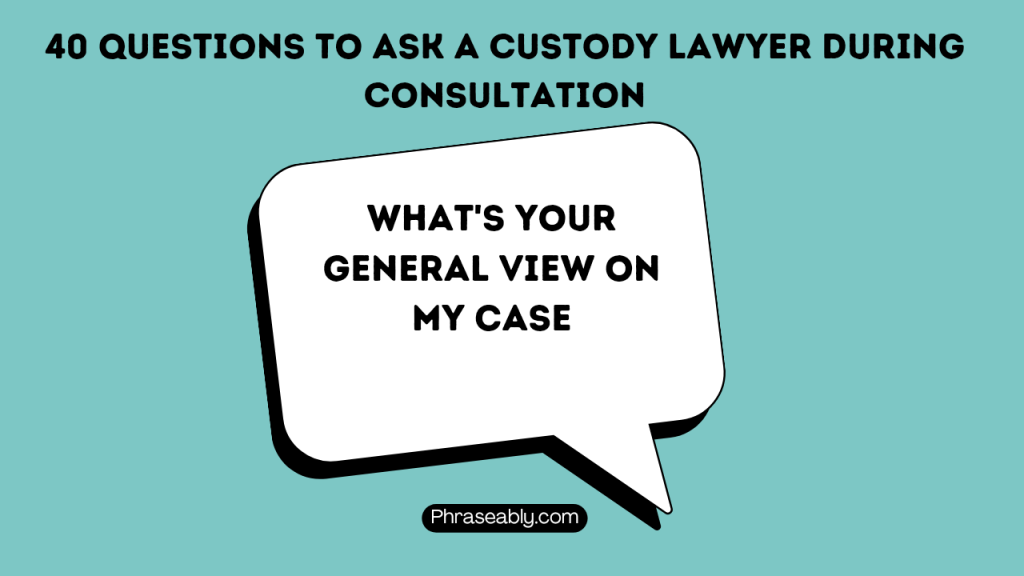
After discussing your case with a custody lawyer, you should ask them their take.
While your goal is to win, it’s best to know your attorney’s view about that. Also, you should have a lawyer who’s truthful about the whole thing rather than someone who’d twist the truth to keep you very hopeful.
So, a custody lawyer should give his two cents about your situation, letting you in on how likely things will turn out.
How Often Do You Keep in Touch?
You’d want a lawyer who’ll frequently communicate with you during the process.
You must be carried along during the stages, whether you’re settling in a court or outside. So, ask them how often they’ll keep in touch and let them know how you’d like the whole process to go.
Have You Had a Case That Closely Resembles Mine, and How Did You Handle It?
Every child custody case is unique. However, there are similar cases that lawyers handle all the time. Cases that have to do with domestic violence, drunkenness, prison, etc.
So, you should ask a custody lawyer if they’ve had any similar cases and how they handled them.
Can We Settle This Case Out of Court?
Child custody cases can be settled out of court. Most times, both parties can reach an agreement or settlement without going to court with a lawyer present as a guide.
So, you can have this discussion with a custody lawyer. They should be able to evaluate your case and see if a settlement outside court is okay, especially if you’re low on cash.
How Much Should I Budget?
You should also discuss their fee with a custody attorney. They should be able to tell you how much it’ll cost to hire them and to cater to other needs like filing papers and the rest.
This discussion will help you plan well and budget the right amount.
Will Any Additional Cost Arise?
You should also find out from a custody lawyer if any additional charges are likely to arise.
Also, it’s better to budget enough to cater to any extra charges whether their answer is positive or not.
What Information Will You Need from Me?
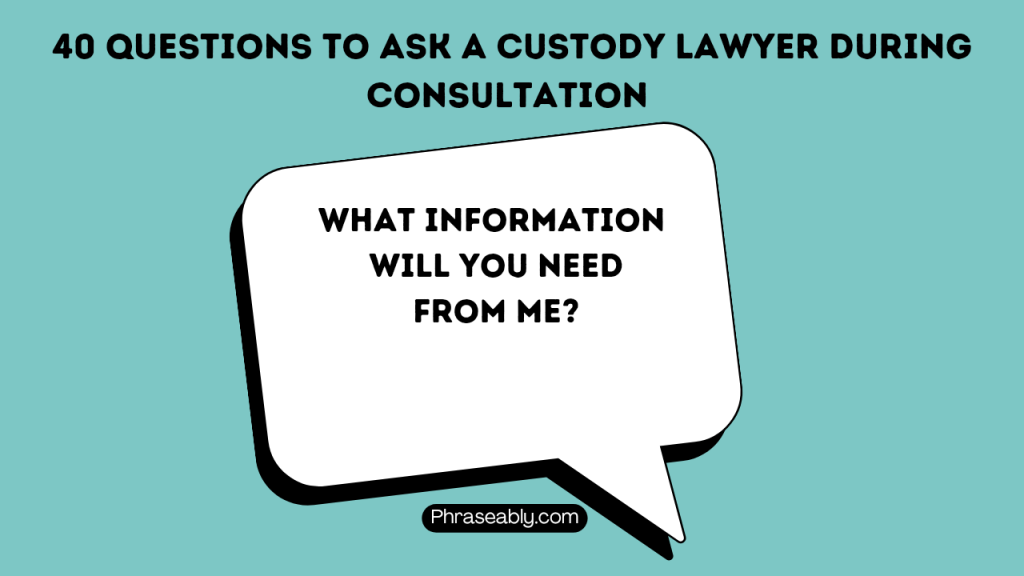
A good lawyer who knows the job would want to know all there’s to know about your case to know the best way to help you.
In a child custody case, your attorney will ask you certain questions about your marriage, child care, and other important questions to assess your case properly.
So, getting this information from you is critical to helping you win.
What Are the Things I Should Avoid That Can Weaken the Case?
Another important question you shouldn’t fail to ask a custody lawyer is things you should avoid that can weaken your chances of winning.
Certain things like lying, disrespecting court orders, disrespecting the other parent, and abuse of drugs or alcohol are some of the things to avoid during a child custody battle.
So, talk to your lawyer about these things.
What’s the Time Frame for Settling a Child Custody Case?
The time frame for settling a child custody battle depends on several factors. If multiple issues are involved, including visitation rights, joint custody, and residential and legal custody, your case can take longer to be resolved.
What Are the Different Stages Involved?
You can also ask a custody attorney about the different stages of a child custody battle. Their answer will help you learn about how the whole process will go.
How Many Times Do We Have to Meet?
You can also discuss with a custody lawyer the number of times you have to meet so you can make your plans and make adjustments when necessary.
How Many Hours Do Meetings Take?
You should also discuss with a custody lawyer the number of hours you’ll have to meet.
This discussion will help you make the necessary plans, taking into consideration other engagements you have.
What Are My Rights?
As a parent, you have rights as it relates to your children’s upbringing and care, including education, welfare, and medicals.
So, while in a custody battle, you should have this discussion with your lawyer to know how to follow up with your case.
Does the Child Have a Say?
A child can have a say during a child custody case if they have attained a level of reasoning, usually from age 14.
However, the court can overrule a child’s preference if they feel it isn’t in their best interest. Conversely, a child who has attained adulthood has a right to choose whom they want to live with.
What’s the Right Way to File for Custody?
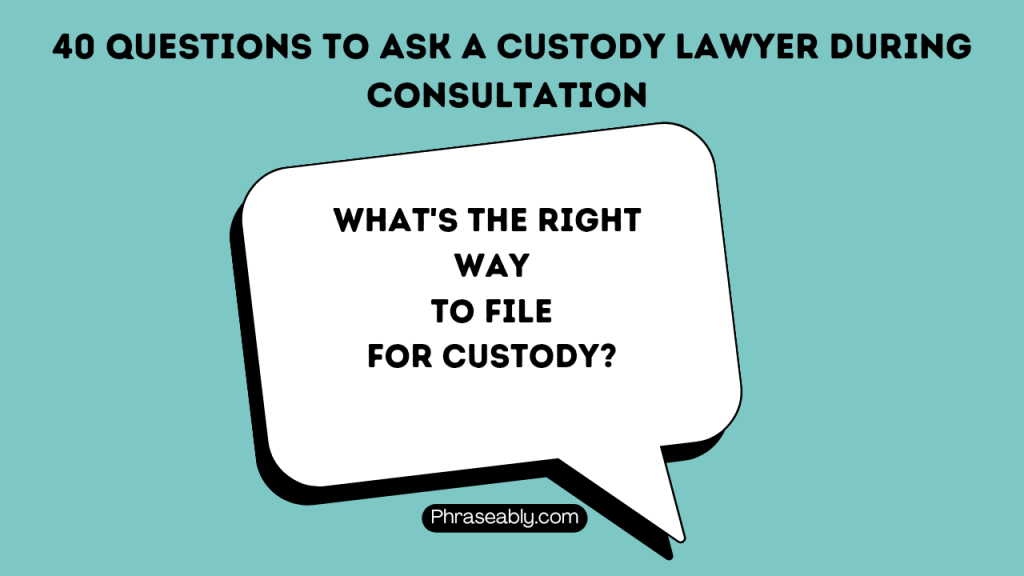
You should also discuss with your custody lawyer the right way to file for custody if you’ll be pursuing a court case.
Your lawyer can help you prepare the necessary papers.
How Does Joint Custody Work?
Joint custody means that both parents have equal rights to the child’s upbringing. There are two types: joint physical custody and joint legal custody.
Joint physical custody means the child gets to share time equally with both parents. Also, the child can live with one parent but has visitation time with other parents.
On the other hand, joint legal custody takes care of responsibilities towards the child. It means both parents have equal rights to make decisions about their children.
What Are the Things the Court Looks Out for to Determine Custody?
You should also discuss with your custody lawyer the things the court looks out for when determining custody.
These things include a child’s preference, history of abuse, violence, use of drugs, parent’s mental health, and several more.
What Exactly Does “Best Interest” Mean?
“Best interest” of a child during a child custody case is a legal criteria the court uses to ascertain what’s best for the child’s mental, physical, and emotional welfare.
This standard helps the court determine the parent best suited to cater to the child’s best interest.
Can You Explain Physical and Legal Custody?
Physical custody determines who the child primarily lives with. As I’ve earlier mentioned, in joint custody, the child can share equal time with the parents daily or live primarily with one parent and have visiting time with the other.
On the other hand, legal custody deals with the right to make decisions about the child.
If a parent gets full custody, it means they have the right to make decisions without consulting the other parents.
Can My Child Choose Whom They Want to Live with Even After I’ve Gained Custody?
Until a child attains adulthood, they can’t choose who they want to live with.
Do Mothers Stand a Better Chance?
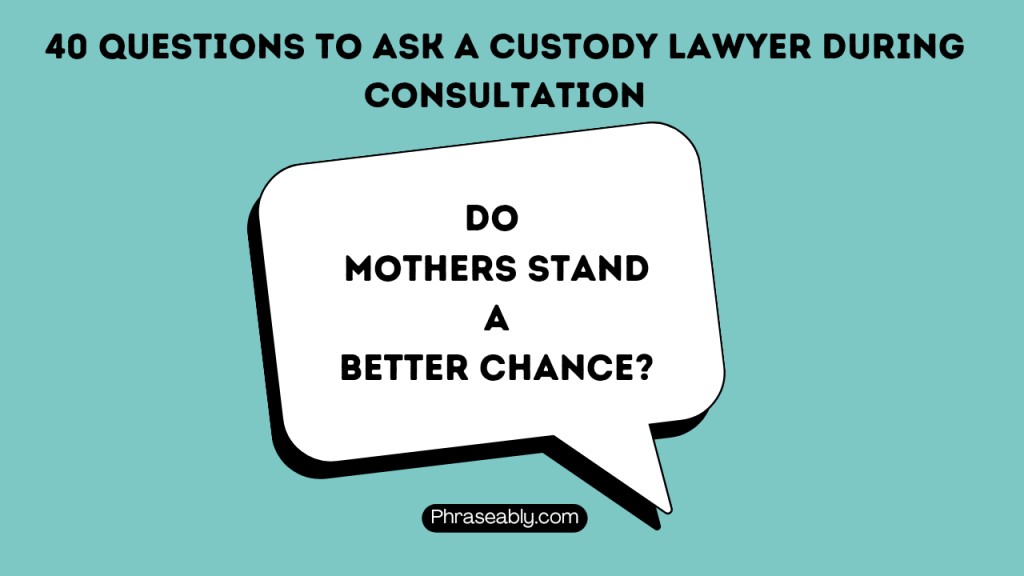
Previously, mothers have always stood a better chance of getting custody because mothers are traditionally seen as the primary carer of a child.
However, these days, both parents are given equal consideration.
What Ways Can I Prove I’m Better off Getting Custody?
You should discuss with your lawyer ways to plead your case to the court, especially if the other parent isn’t good for your child.
Even if I Get Full Custody, Can the Other Parents Have a Say?
Full custody means you own the sole right to take care of a child without consulting the other parent.
What Does Full Custody Entail for the Other Parents?
If one parent gets full or sole custody, it means they have exclusive rights to make important decisions concerning the child. However, the other parent can have visitation rights depending on several factors.
How Does Child Support Work?
Child support is a financial obligation a parent makes toward a child during separation or divorce until the child reaches a certain age.
In joint custody, parents often share responsibilities equally including financial responsibilities. However, a higher-earning parent can be ordered to pay child support.
In addition, you can request for child support if you get full custody.
Do Women Pay Child Support?
Yes, women pay child support. If the man is the custodial parent, the woman can be ordered to pay child support. Also, in cases of joint custody, if she’s the higher earner, she can be asked to pay child support.
What Are the Things That Can Make Me Lose Custody?
You should also discuss things that can make you lose custody with your lawyer so you avoid them.
Can There Ever Be a Time When My Custody Rights Are Withdrawn?
Yes, custody rights can be terminated if the child’s physical, mental, and emotional wellness is tampered with or threatened.
Can I Regain Custody Rights After I’ve Mended My Ways?
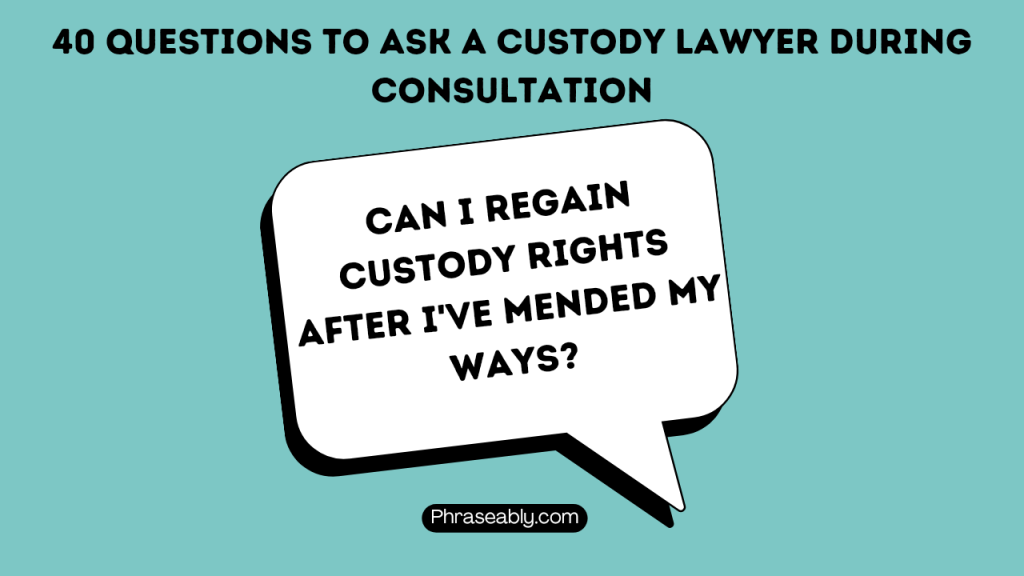
Yes, one can regain custody rights after losing the right if circumstances change.
However, they’ll need to prove to the court that they can now cater to the best interest of the child.
What Are My Chances of Winning?
You should also discuss with your lawyer your chances of winning.
Where Do Grandparents Stand in All This?
Grandparents of either parent can get visitation rights if they’re safe for the children. Also, grandparents can claim custody if the court declares both parents unfit.
What Additional Things Should I Know?
Finally, you should ask your child custody attorney what other things you should know that haven’t been discussed.
